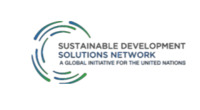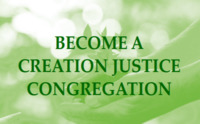Search
72 items
-
Engaged Organizations: Ignation Solidarity Network
Ignation Solidarity Network discuss their work as it relates to Pope Francis's Laudato Si' encyclical to care for creation and our common home. As stated in their website:
"In his historic encyclical on ecology, Laudato Si’, Pope Francis calls on all people to care for creation and our common home. Pope Francis makes clear that our care for one another and our care for the earth are intimately connected, noting that humanity is not faced 'with two separate crises, one environmental and the other social, but rather one complex crisis which is both social and environmental.' (Laudato Si’: On Care for Our Common Home)."
"We ask our government leaders to demonstrate bold leadership in addressing the climate crisis by honoring the Paris Agreement, contributing to the Green Climate Fund, implementing the Clean Power Plan and supporting just transition and job creation." -
Engaged Organizations: Global Catholic Climate Movement
Global Catholic Climate Movement discuss their identity and mission through the following excerpts from their website:
"Who we are
The Global Catholic Climate Movement is a first-of-its-kind international coalition of Catholics from many nations, continents, and walks of life. We are laity, religious, and clergy, theologians, scientists, and activists from Argentina, the Philippines, the United Kingdom, Kenya, Australia, the United States, and many other nations. We are united by our Catholic faith and our work in various roles and organizations on climate change issues."
"First, we recognize that conversations about the climate crisis have historically been more about intellectual arguments than about the profound spiritual and moral implications of our failure to care for God’s creation. Catholic leaders are thus called to speak with a prophetic voice and in a spiritual dialogue with all people, especially those political and business leaders and consumers who engage in climatically destructive policies and practices. And we recognize our own need for ongoing conversion to live more in keeping with the Creator’s intentions for life in abundance for all people. Until the moral implications of anthropogenic climate change are clearly established and accepted, it is unlikely that societies can or will transition in an appropriate timeframe to sustainable technologies, economies, and lifestyles." -
Engaged Organizations: Association of United States Catholic Priests
The Association of United States Catholic Priests discuss their climate change initiative on their website. The following excerpt list the first five "Green Commandments" from Fr. Joshtrom Isaac Kureethadamof's book on Laudato Si':
"Earth, our common home, is in peril. Take care of it.
Listen to the cry of the poor who are the disproportionate victims of the crisis of our common home.
Rediscover a theological vision of the natural world as good news/gospel.
Recognize that the abuse of creation is ecological sin.
Acknowledge the deeper human roots of the crisis of our common home." -
Declaration of the Health of People, Health of Planet and Our Responsibility Climate Change, Air Pollution and Health Workshop
The Pontifical Academy of Sciences posted findings and proposed solutions addressing problems of health of people and our planet, with a specific focus on climate change and air pollution, on their website. They present findings and proposed solutions that were presented at one of their workshop from November 2-4, 2017: -
Sikh Faith Statement on the Environment
This Sikh faith statement on the environment, based on the 1995 Windsor Statements, is posted on the Interfaith Center for Sustainable Development. Below is the introduction to the statement:
"The Sikh scripture, Guru Granth Sahib, declares that the purpose of human beings is to achieve a blissful state and to be in harmony with the earth and all creation. It seems, however, that humans have drifted away from that ideal. For the earth is today saturated with problems. It is agonizing over the fate of its inhabitants and their future! It is in peril as never before. Its lakes and rivers are being choked, killing its marine life. Its forests are being denuded. A smoky haze envelops the cities of the world. Human beings are exploiting human beings." -
Buddhist Faith Statement on the Environment
Interfaith Center for Sustainable Development posted a Buddhist faith statement on the environment on their website. According to the Vietnamese monk Venerable Thich Nhat Hanh:
“Buddhists believe that the reality of the interconnectedness of human beings, society and Nature will reveal itself more and more to us as we gradually recover—as we gradually cease to be possessed by anxiety, fear, and the dispersion of the mind. Among the three—human beings, society, and Nature—it is us who begin to effect change. But in order to effect change we must recover ourselves, one must be whole. Since this requires the kind of environment favorable to one’s healing, one must seek the kind of lifestyle that is free from the destruction of one’s humanness. Efforts to change the environment and to change oneself are both necessary. But we know how difficult it is to change the environment if individuals themselves are not in a state of equilibrium.” -
Christian Ecology
Interfaith Center for Sustainability Development posted a Christian ecology statement, based on the 1995 Windsor Statements, on their website. The following is an excerpt discussing the challenges that have persisted over time with regard to the care for creation:
"In the words of the Orthodox Patriarchate, ‘This may well mean that just as a shepherd will in times of greatest hazard lay down his life for his flock, so human beings may need to forego part of their wants and needs in order that the survival of the natural world can be assured.'
The challenge to all Christians is to discover anew the truth that God’s love and liberation is for all creation, not just humanity, and to seek new ways of living that restore balance and hope of life to the endangered planet." -
Anglican Views on Climate Change - a report compiled by the Climate Institute of Australia
Interfaith Center for Sustainable Development posted a report, compiled by the Climate Institute of Australia, on Anglican views of climate change. A predominant them includes the toll that greed and selfishness takes on God's creation. It focuses on specific actions that individuals can take to reduce energy usage and foster environmental justice for the world population. -
Engaged Organizations: Sadhana: Coalition of Progressive Hindus
Sadhana is a non-profit organization that is committed to promoting environmental and social justice through the values of the Hindu faith. The NYC Service website summarizes what Sadhana is about:
"We have mobilized Hindus in New York City and beyond to stand up for social justice causes including environmental justice, racial and economic justice, gender equity, immigrant rights, and anti-casteism. We bring a Hindu voice to the interfaith justice movement. We have chapters and members around the country and abroad. We engage and mobilize progressive Hindus nationally and internationally using social media." -
Declaration of Religious Leaders, Political Leaders, Business Leaders, Scientists and Development Practitioners
Business and political leaders, and scientists from around the world have congregated at the Pontifical Academies of Sciences and Social Sciences to address the climate change crisis. The introduction to the declaration is stated below:
"We the undersigned have assembled at the Pontifical Academies of Sciences and Social Sciences to address the challenges of human-induced climate change, extreme poverty, and social marginalization, including human trafficking, in the context of sustainable development. We join together from many faiths and walks of life, reflecting humanity’s shared yearning for peace, happiness, prosperity, justice, and environmental sustainability.
We have considered the overwhelming scientific evidence regarding human-induced climate change, the loss of biodiversity, and the vulnerabilities of the poor to economic,social, and environmental shocks." -
Catholic Bishops' statement in Lima on the road to Paris
During the High-level event at the COP20 in Lima, Bishops from around the world called for a fair and legally binding climate agreement to be signed at the COP21 in Paris, 2015. One segment of the introduction is shown below:
"Following the evangelical option for the poor, we work closely with the most vulnerable communities and the excluded and as such are closely attuned to how the problem of climate change is affecting them. Our message to political leaders and all people of good will is rooted in the experience and suffering of these poor communities.
Humankind on the Planet Earth is ordained to live in equity, justice and dignity, peace and harmony in the midst of the order of Creation. Humankind is ordered to treat respectfully Creation, which has a value in itself. We Catholic Bishops recognize the atmosphere, rainforests, oceans and agricultural land as common good that require our care." -
Address at the United Nations Climate Change Conference given by H.E. Archbishop James Patrick Green
H.E. Archbishop James Patrick Green provides a statement on the impact of climate change on poverty at the United Nations Conference in Lima, Peru on December 10, 2014. He discusses the interdependence of humans and the Earth. He emphasizes Pope Francis's call for intervention to fight against global warming in order to protect the planet and, in particular, those at the poverty level. -
America Baptist Churches USA (ABCUSA) Creation Justice Congregations Bulletin
America Baptist Churches USA (ABCUSA) has created a bulletin insert that discusses how congregations can earn certificates of achievement for implementing eco-justice measures. Further details are discussed below:
"Creation Justice Congregations is an environmental education, stewardship, and justice program sponsored by the Creation Justice Network of the American Baptist Churches USA. Through this program your congregation can earn certificates of achievement for implementing eco-justice measures in your building, within your congregations, and in your ministries of outreach and justice.
Creation Justice Congregations has three stages, each with a checklist of suggested education, worship, and other action items that can help bring Baptist churches into the wider movement for peace, justice, and reconciliation with all of God's creation. " -
Message of His All Holiness Ecumenical Patriarch Bartholomew on the Day of the Protection of the Environment
Patriarch Bartholomew I of Constantinople delivered a speech on January 9, 2018 for the Day of Prayer for the Protection of the Environment. The following one salient excerpt from the speech:
"The Ecumenical Patriarchate’s ecological initiatives provided a stimulus for theology to showcase the environmentally-friendly principles of Christian anthropology and cosmology as well as to promote the truth that no vision for humanity’s journey through history has any value if it does not also include the expectation of a world that functions as a real “home” (oikos) for humanity, particularly at a time when the ongoing and increasing threat against the natural environment is fraught with the possibility of worldwide ecological destruction. This evolution is a consequence of a specific choice of economic, technological and social development that respects neither the value of the human being nor the sanctity of nature. It is impossible to truly care for human beings while at the same time destroying the natural environment as the very foundation of life, essentially undermining the future of humanity." -
Episcopalians Confronting Climate Change
This article discusses American Episcopalians' concern over climate change and the impact with regard to those facing poverty. The introduction to the article is stated below:
"In September 2011, the House of Bishops in the Episcopal Church, attending a meeting in Quito, Ecuador, sent a pastoral letter to Episcopal clergy worldwide expressing 'mounting urgency' to address climate change within church membership. The letter argued the critical need for Christians to care for all of God’s creation and urged that justice be sought for the poor, who it said will suffer most from climate change." -
Preachable Moments: Evangelical Christians and Climate Change
This article by Yale Climate Connections provides encouraging news of how some evangelical Christians are re-examining their stance on climate change. The following is an excerpt from the article:
"About 60 percent of evangelicals think climate change has nothing to do with human activities. By comparison, less than half of all Americans, or 47 percent, share that view. (Both figures are in sharp contrast to the overwhelming majority of climate scientists who agree that climate change is occurring and primarily caused by human actions).
Richard Cizik sees climate change as ‘top-tier issue’ for younger evangelicals. But the theological doors are beginning to open. Signs are that more evangelicals now are addressing climate change as a moral issue that appeals to the conscience of their Christian communities." -
Climate Change: An Evangelical Call to Action
This statement on climate change from members of the Evangelical Climate Initiative encourages church leaders and congregation members do what they can to take action to protect the Earth. A brief description of the group is provided below:
"The Evangelical Climate Initiative (ECI) is a group of over 300 senior evangelical leaders in the United States who are convinced it is time for our country to help solve the problem of global warming. We seek to do so in a way that creates jobs, cleans up our environment, and enhances national security by reducing our dependence on foreign oil, thereby creating a safe and a healthy future for our children. Our deep commitment to Jesus Christ and his commands to love our neighbors, care for “the least of these,” and be proper stewards of His creation compels us to act. Our views are articulated on the ECI statement page." -
ELCA issues statement on Pope Francis’s encyclical on climate change
In an effort to demonstrate solidarity of interfaith-based environmental action, the Evangelical Lutheran Church in America released a statement in support of Pope Francis's encyclical on climate change. The following concluding excerpt emphasizes the movement of solidarity within the statement:
"Today we join with Pope Francis in calling on world leaders to embrace our common responsibility as work continues toward a global agreement on climate change. We urge leaders to support an ambitious agreement that reduces greenhouse gas emissions, encourages development of low-carbon technologies, and supports the ability of countries to cope with the effects of a changing climate and build resiliency for a sustainable future." -
Lutherans Reflect on Climate Change Conference in Copenhagen
This article discusses some of the sentiments regarding proceedings from the 2009 United Nations Climate Change Conference in Copenhagen. While some attendees expressed disappointment in the outcome, others were more optimistic about steps which may lead to more effective action for climate change in the future. The following excerpt provides a brief description of the event:
"More than 3,000 ELCA members, along with a coalition of U.S. faith leaders, sent some 20,000 postcards to President Barack Obama, urging him to be at the meeting, she said. Obama attended the conference and urged leaders of Brazil, China, India and South Africa to join the United States 'to fund developing nations' projects to deal with droughts,
floods and other impacts of climate change, and to develop clean energy,' among other agreements, according to a U.N. news release." -
Why Lutherans Care for Creation
This article discusses how various concepts of Lutheran theology are woven into ecological messages with regard to God as creator, human interactions, and ways of worship. The following is a section from the introduction of the article, emphasizing human responsibility towards care for the Earth:
"For Christians, care of the Earth is not an 'environmental cause.' Rather, it is central to our holy calling to treasure the Earth and to care for it as our common home, fully integrating creation-care into our love of God and neighbor. Without sacrificing the transformational effects of the 16th-century Reformation, we are called to embrace an eco-reformation that will re-examine and rethink how we read the Bible, how we can expand the scope of our theology, how we can reconfigure our personal vocation and our common ethic, how we worship, how we organize our church life together, and how we understand ourselves as creatures within creation as a whole. This call to continuing reformation is for the whole church, not solely for the committed. Earth care is not an add-on. It is not just for those who happen to be interested in it. It is a call for all Christians to participate in this great work of our time." -
Caring for Creation Today
This video, put forth by the Evangelical Church in America, encourages individuals to act as stewards by both assisting those in need and caring for our land, as God had intended. The salient message is to do what you can to work for change and care for God's creation, as this is our duty as humans. -
Engaged Organizations: Islamic Society of North America
The Islamic Society of North America, headquartered in Plainfield, Indiana, has been described as the largest Muslim community in North America. Their vision includes empowerment of the Muslim community to strengthen interfaith relations, increase civic engagement, and promulgate a better understanding of the Islamic faith. They strive for organizational excellence, achieving this in part through their efficient operations, transparency, and financial stability. They seek to achieve their strategic goals by providing high quality programming and services for the Muslim community, increasing opportunities for civic engagement, and hosting an annual convention to gather in large numbers and discuss current issues that are affecting their community.
Part of the organization's mission is to focus on increasing sustainable practices within the Muslim community. Through the work of the Masjid Development Committee in December 2014, the ISNA Green Masjid Initiative Team was formed as “Green Masjid Task Group” and later renamed the "ISNA Green Initiative." The intent was to create awareness and to provide guidance on transforming mosques/Islamic centers to become more environmentally friendly through the use of sustainable practices.






















